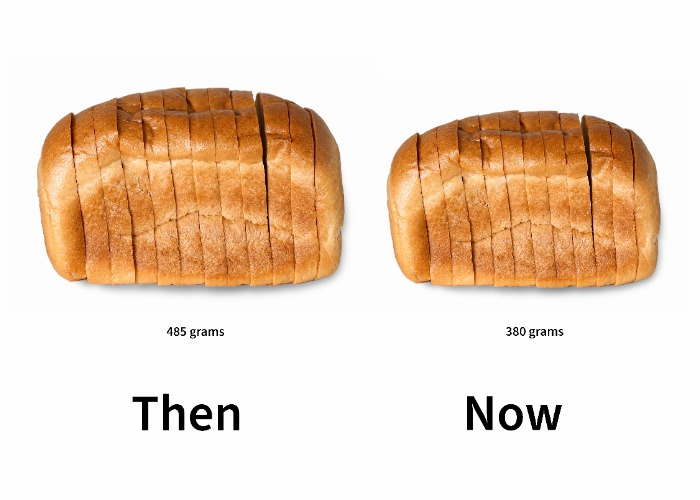Opinion: time for supermarkets to be honest about shrinkflation con

No one likes price hikes, but at least they are upfront and clear. Unlike shrinkflation.
It’s no secret supermarket prices are rising at an astonishing rate.
Food price inflation is currently 13.6%, having soared as high as 19.2% earlier this year.
What’s particularly galling amidst these budget-busting hikes is the fact that many of the products we buy at the supermarket are getting smaller at the same time.
Read: the price scourge that means we pay more for less
Shrinkflation: a dishonest practice
If a company wants to ramp up its profit margins while keeping its price point similar to that of rivals then it has an obvious option: shrink the product size but not the price.
Often, they will laughably defend such moves as being for the benefit of shoppers.
You can find many such examples from companies online, but the argument effectively goes like this: ‘Costs are rising and we know customers are struggling, so rather than charge them more we’ve decided to slightly reduce the size’.
But this practice, known as shrinkflation, has long been one of the biggest bugbears for shoppers.
While price hikes are never going to be popular, they are at least clear to the shopper.
Most of us know broadly how much our favourite products cost, and will be aware when that changes. It's also simply far easier to compare products by price.
But, with shrinkflation, it can be difficult to ascertain what’s changed as the new portion size is packaged in such a clever way that you might not notice you’re getting less.
In our view, it has all the impact of a price hike with none of the honesty.
But it doesn’t have to be that way.
See our roundup of the best supermarket deals each week (updates Friday)
Why can’t more supermarkets and suppliers be honest?
French supermarket chain Carrefour has come up with a novel idea: being upfront with shoppers when portion sizes change.
It has started putting shrinkflation warnings on affected products that it stocks in stores.
These say: “This product has seen its volume or weight fall and the effective price by the supplier rise.”
In announcing the move, it also highlighted just how big an impact the practice can have on our pockets.
It cited the example of a smaller bottle of Lipton Iced Tea, which has led to an effective 40% price hike per litre.
See the below tweet from Reuters for more on the story.
France's Carrefour has added warnings to products it says have shrunk in size but cost more even as prices have eased https://t.co/gC7xSV9vz8 pic.twitter.com/ybJeTq7eiR
— Reuters (@Reuters) September 18, 2023
Wouldn’t it be great to see this practice picked up by UK supermarkets?
It wouldn’t require a huge amount of effort on their part to put up such warnings and it would be a big help to shoppers.
In the midst of a cost-of-living crisis, we need all the help we can get to help us spot when we’re being ripped off.
So, could it happen?
‘Making prices clearer for consumers’
“Carrefour appears to be taking the lead and setting an example to the rest of the European grocery pack with this initiative,” said Susannah Streeter, head of money and markets at Hargreaves Lansdown.
Speaking to MailOnline, she added: “No one wants to be put on the naughty shelf, so this will hopefully nudge the big consumer goods giants into making prices clearer for consumers.”
While it’s not impossible that our supermarkets could follow Carrefour's lead of their own accord, we think it seems more likely that it will take Government intervention to get this implemented.
After all, some supermarkets are using shrinkflation themselves on many of their own-brand products, so it seems unlikely it’s something they’d want to draw attention to.
While we wait in hope, it’s important you pay especially close attention to the items you put in your trolley to avoid falling victim to the shrinkflation con.
For those who shop online, it can be trickier to spot these changes, but not impossible.
Most supermarkets allow shoppers to leave comments below each product.
Those who have been stung by shrinkflation will often take the time to point out the change on the product page with a strongly worded review.
Checking the comments will mean your online shop takes a little longer, but rather that than risk effectively being hit with a 40% price hike.
Read this next: Tesco & Sainsbury's accused of misleading customers on deal pricing
Comments
Be the first to comment
Do you want to comment on this article? You need to be signed in for this feature